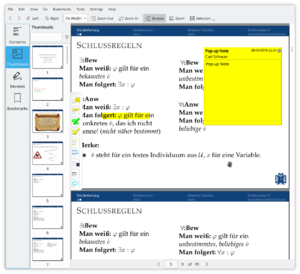Okular/es: Difference between revisions
(Updating to match new version of source page) |
(Updating to match new version of source page) |
||
| Line 13: | Line 13: | ||
El desarrollo comenzó como parte del programa Google's Summer of Code. La descripción del proyecto se encuentra en[http://developer.kde.org/summerofcode/okular.html KDE Developer's Corner]. | El desarrollo comenzó como parte del programa Google's Summer of Code. La descripción del proyecto se encuentra en[http://developer.kde.org/summerofcode/okular.html KDE Developer's Corner]. | ||
Okular | '''Okular''' combines the excellent functionalities of [[Special:myLanguage/KPDF|KPDF]] with the versatility of supporting different kinds of documents, like PDF, Postscript, DjVu, CHM, and others. | ||
La [http://okular.kde.org/formats.php página de formatos compatibles] tiene un cuadro que describe con más detalle los formatos compatibles y las características aplicables a cada uno de ellos. | La [http://okular.kde.org/formats.php página de formatos compatibles] tiene un cuadro que describe con más detalle los formatos compatibles y las características aplicables a cada uno de ellos. | ||
[[Image:Okular-annotations.png|thumb|300px|center| | [[Image:Okular-annotations.png|thumb|300px|center|Annotations in Okular, which can be saved within the PDF file]] | ||
| Line 40: | Line 40: | ||
How to keep the annotations you made to the PDF file: | How to keep the annotations you made to the PDF file: | ||
By default, Okular saves annotations in the local data directory for each user. Since KDE 4.9, it's optionally possible to store them directly in a PDF file by choosing | By default, '''Okular''' saves annotations in the local data directory for each user. Since KDE 4.9, it's optionally possible to store them directly in a PDF file by choosing <menuchoice>File -> Save As...</menuchoice>, so they can be seen in other PDF viewers. | ||
Note that this feature requires Poppler 0.20 or newer for regular PDF documents. If the PDF document you are annotating is encrypted, this feature requires Poppler 0.22 or newer. | Note that this feature requires Poppler 0.20 or newer for regular PDF documents. If the PDF document you are annotating is encrypted, this feature requires Poppler 0.22 or newer. | ||
[[Category:Gráficos/es]] | [[Category:Gráficos/es]] | ||
Revision as of 16:40, 21 July 2018
¿Qué es Okular?
 |
Okular es un visor universal de documentos para KDE SC 4.x |
Puedes seguir el desarrollo en la página web del proyecto.
Antecedentes
El desarrollo comenzó como parte del programa Google's Summer of Code. La descripción del proyecto se encuentra enKDE Developer's Corner.
Okular combines the excellent functionalities of KPDF with the versatility of supporting different kinds of documents, like PDF, Postscript, DjVu, CHM, and others.
La página de formatos compatibles tiene un cuadro que describe con más detalle los formatos compatibles y las características aplicables a cada uno de ellos.

Además de trabajar con muchos formatos, Okular ofrece características como selección de texto, anotaciones, extracción de archivos incrustados en documentos, y muchas otras sorpresas. Puedes ver imágenes de Okular en acción aquí.
Puedes hablar con los desarrolladores y otros usuarios usando IRC, en irc.freenode.org, canal #okular.
If you are interested in contributing to Okular, please contact the team. Programmers and non-coders are welcome all the same.
Consejos y trucos
Printing
En este tema del foro un usuario afirmó que Okular no podía imprimir PDFs. El problema fue debido a que el archivo ~/.cups/lpoptions estaba corrupto. Al renombrar este archivo se permitió a Okular reconstruirlo, después de lo que él no tuvo más problemas a la hora de imprimir PDFs.
Reviewing Documents / Annotations
Double clicking on either one of the Review tools (F6) allows you to make multiple annotations without having to reactivate the tool after the first time.
How to keep the annotations you made to the PDF file:
By default, Okular saves annotations in the local data directory for each user. Since KDE 4.9, it's optionally possible to store them directly in a PDF file by choosing , so they can be seen in other PDF viewers. Note that this feature requires Poppler 0.20 or newer for regular PDF documents. If the PDF document you are annotating is encrypted, this feature requires Poppler 0.22 or newer.
